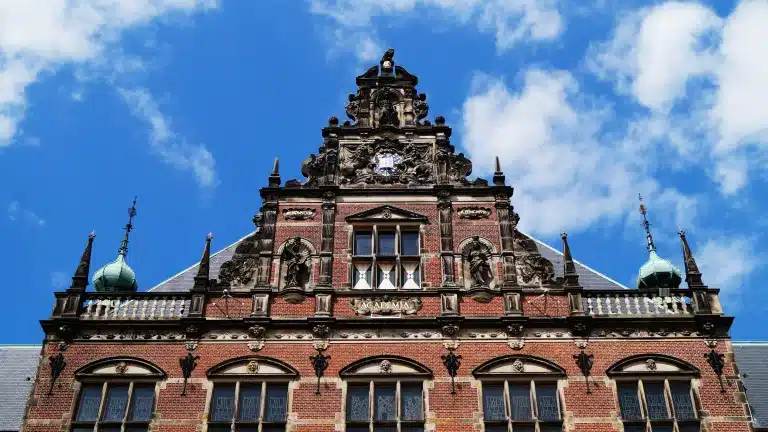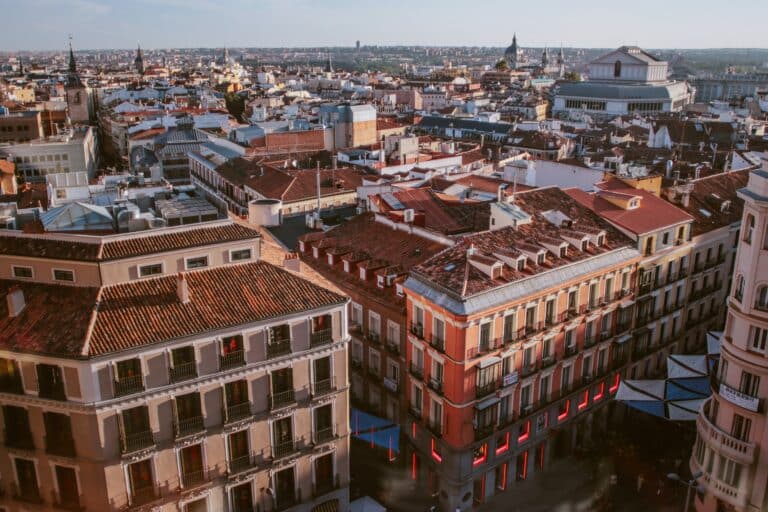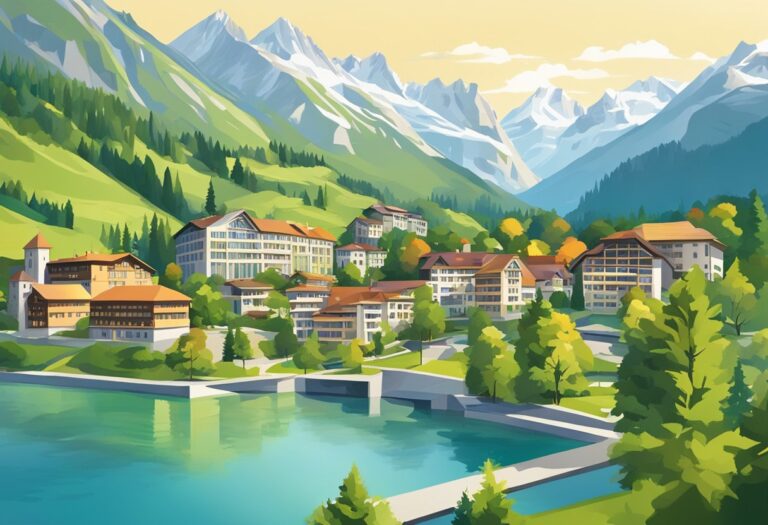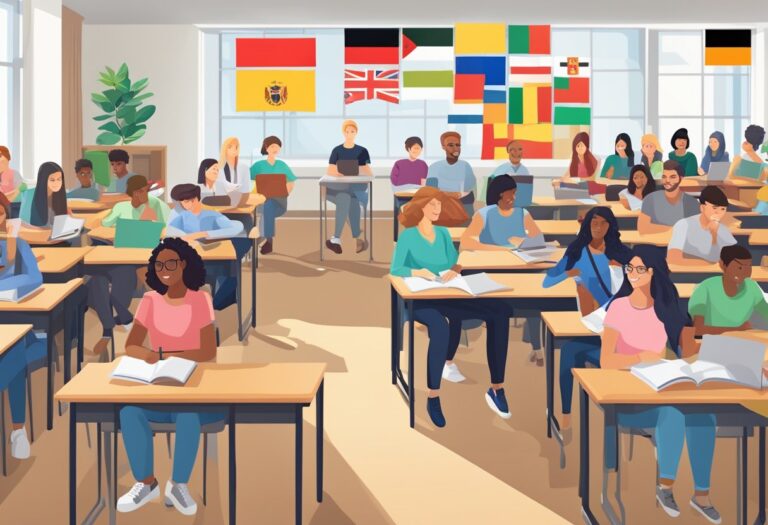Complete Guide to University of Groningen for International Students
About Groningen University
One of Europe’s oldest schools, this public research university is located in the heart of Groningen, Netherlands, a young and student-centered city with a lively reputation. UG is widely considered one of the most prestigious schools in the Netherlands, and in Europe.

Is University of Groningen a Good School?
Indeed. Regularly at the forefront of our featured school lists, University of Groningen is consistently ranked and considered one of the top 100 global universities according to lead ranking tables.
English-taught Degrees
The University of Groningen has a breathtaking 37 accredited, English-taught undergraduate degree programs and 151 master’s programs in our database that span the range of most study-areas. You can filter through them by tuition and area of study with a membership to Beyond the States.
What is the University of Groningen Known For?
Groningen University is one of the oldest schools in the Netherlands, founded in 1614. It is renowned for its groundbreaking educational research, and vibrant international community representing 120 nationalities.
From the University of Groningen’s profile page:
The University of Groningen is an internationally oriented university with a rich academic tradition. Since the establishment in 1614, the university has brought forward striving academics, like the first female student, the first Dutch astronaut and various Nobel prize winners.
Is University of Groningen Prestigious?
Yes! The University of Groningen consistently finds itself in the top 100 of all the influential rankings worldwide. As well, it is ranked #1 on our own Top 10 Universities in Europe for International Students – Bachelor’s Rankings 2023.
Notable Alumni
The Nobel Prize in Chemistry went to the Dutch organic chemist, Ben Feringa, in 2016, for his discovery of the “molecular machine”, and in Physics to the Dutch physicist, Frits Zernike, in 1953, who invented the phase contrast microscope – both are alumni of University of Groningen .
Other lesser known Nobel Prize winners carried out important research at the university, and received their prizes in Physics and Medicine. As well, the first woman to graduate from a Dutch university, Aletta Jacobs, attended University of Groningen, in the late 1800’s.

Studying at University of Groningen
The University of Groningen offers a wealth of English-taught degree programmes in Sciences, Medicine, Economics & Business, Social Sciences and Humanities. To boot, the University College Groningen offers a Liberal Arts and Sciences programme. (Scroll down to read more about UCG, which is within the university itself.)
Does the University of Groningen Teach in English?
Yes! Compared to other European universities, University of Groningen has a staggering amount of accredited, 100% English-taught degree programmes that are welcoming to international students. It can be hard to find unbiased, organized information on these English-taught programs, but you can get it all in one place in the Beyond the States database.
No foreign language required.
Choosing an Area of Study
You’ll find the gamut of study areas, taught in English, at University of Groningen. Degrees within the fields of computer science, religious studies, social sciences, academic research, medical sciences, natural sciences, and more. Many of these undergraduate programs are 3 years in duration, and master’s programs are 1 year in duration.
Course Structure
At the University of Groningen classes have a lecture component (usually around 200 students), but the same class also has seminar groups with the professor. These are usually limited to 10-15 students and attendance is mandatory. Students are encouraged-and expected-to disagree with the professor during these group discussions, which can be hard for some international students to adjust to.
The other expectation that some American students (specifically) have trouble adjusting to relates to self- study. At the beginning of the 9 week block, students receive a schedule that communicates what will be taught each week along with the expected reading throughout the week to prepare for the lecture and seminar group. This is not checked on through assignments, but will determine success for the test at the end of the semester, which is usually all the grade for the class is based on.
Grading System in the Netherlands
Speaking of grades, don’t expect A’s! The Dutch use a 10 point grading system. 5 and lower is failing, 6 is ok, 7 is good, 8 is really good, 9 is excellent, and 10 is almost never given as it means you know as much as or more than the professor. More than grades, the emphasis is on making sure that students understand the information.
Some professors have started utilizing a system to evaluate this during their lectures. They have an app that allows professors to ask questions about the lecture he/she is giving and students respond to the questions on their phones. The professor then gets a percentage of the students who got the answer right. If not enough are grasping the topic, he/she knows to elaborate on the topic.
Support for Students
Given the sheer amount of English-taught programs represented at University of Groningen you know the university is accustomed to serving a large international student body. This usually entails that robust student supports and resources are in place, and that is true in this case. The school has a career services center, a student service center, and resources for students with functional impairments and special needs.
Featured Programs at University of Gröningen
Each month we carefully select two programs in our database – one bachelor’s and one master’s – that really stand out to us, and we want to call attention to.
University of Groningen has been featured a few times in our Program of the Month series in our database. We take a deep dive into these programs that fall into the Communication and Media studies category, as well Tourism area of study, and one at University College Fryslân, another university college within the University of Groningen. This campus is located in Leeuwarden, Netherlands, just west of the city of Groningen.
Dig in to our Program of the Month series by getting a membership to Beyond the States

University College Groningen – A College Within a College
Most of what we’ve discussed so far pertains to overall aspects of the University of Groningen, but now we’re going to dig into the University College Groningen.
University colleges in the Netherlands, such as University College Fryslân and, in this section, the University College Groningen, are the liberal arts program within a research university, and they are each self-contained. UCG is a department of the University of Groningen, which is also a top 100 school across various global rankings.
You Should Know About University College Groningen
Though the overall university is one of the oldest schools in the country (founded in 1614), UCG itself is still a fairly young program, having started in 2015. They stayed intentionally small with around 30 students admitted each year for the first two years in order to straighten out any kinks that arise with any new program. By the third year, they admitted 86 students and anticipate increasing the number of students accepted.
At UCG, their focus is maximizing the integrative aspects of their program, combining more than one area of study. They take an interdisciplinary approach and use problem-based education. During the first year, student take core credits in Global Challenges, Research and Methodology, and Integrative Projects and Academic Skills. The other half of the year is made up of credits from Sciences, Social Sciences, or Humanities.
Student Life at University College Groningen
Like American schools, students choose their major in the second year, after being exposed to the various fields of study. UCG has 5 majors students can choose from: Physics of Energy (which includes Applied Physics, Astronomy, Math and Industrial Engineering), Health and Life Sciences (Global Health, Immunology, Human Anatomy, Genetics, Cell Biology and Biochemistry), Cognition and Behavior (Sociology, Environmental Psychology, Biopsychology, Cognition and Decision Making), Philosophy, Politics, and Economics (International Law, Ethics, Global Economics, Political Science, Cognitive Neuroscience) and Reflecting on Culture, History and Criticism (Culture and Media, History, Religion and Diversity, Cultural Geography, International Relations, Philosophy).
Students have a lot of freedom within their major. A student with a Reflecting on Culture, History and Criticism major, for instance, can have (but isn’t required to have) a lot more variety in their courses than a student who is in a pure culture and media program.
Students also have the opportunity to create their own major by combining areas of study. UCG students are also able to take courses offered by the overall university (which has 37 English conducted bachelor’s programs) which add to the possibilities and flexibility.
Student Housing at UCG
UCG requires that each student lives in a student residence for one year. Students are generally placed together in the residences, which consist of a very large single room with bathrooms, kitchen and living area shared with seven other students.
Here’s a video tour of the residence. These cost around 480 Euros a month. After the first year, students can stay or take advantage of the many other student housing options in Groningen including the new Student Hotel, apartment rentals, or even a houseboat rental!
Integrative Projects
Integrative Projects is a required course of each of the three years, culminating in a 15 credit Capstone Project. The goals of integrative projects is to teach students to communicate across the disciplines, acquire scholarly knowledge, and learn useful ways to apply that knowledge.
The first year, students are given topics such as immigration or global warming and their projects include building communication and presentation skills and developing research approaches. The second year projects focus more on acquiring the scholarly knowledge through a chosen project and the third year students have to set up a project with defined goals for their Capstone Project. Some examples of the projects can be found here
There is a lot of value to having these projects continuously through the years. We already know that the classroom diversity related to the students’ country of origin adds to the educational experience. Integrative projects also have students working with people who have different academic focuses.
In the corporate world, multidisciplinary teams are the norm, so the students are learning skills seen as valuable by future employers. Further, many research universities have a singular research focus at the expense of applied knowledge. The integrative programs provide that applied knowledge component that is often missing.
Virtual Resources
UCG has some great ways to explore the program from afar. First off, their website has some helpful media that speak to students about their majors. And check out this Day in the Life video.
They also have a virtual student for a day program where you can choose from options like webinars, talking to a current student, a Q&A about an academic program, and attending a lecture – all from the comfort of your own home!
Perks of Attending a University College
One of the benefits of attending a university college is that you have the benefits of a small school experience, but also the resources of a large university. Students at UCG can join any of the clubs of the University of Groningen and also have their own student association just for UCG students, called Caerus. This group arranges social and academic activities including parties (lots of parties), dinners, and workshops. You can get an idea for some of the things they do on their Facebook page.
Tuition Costs at University of Groningen
For non-EU students, and international students, the tuition range for undergraduate English-taught degrees is 10,189 – 15,180 euros, and the range for English-taught master’s degrees is 9,000 – 18,850 euros. Recall that many bachelor’s degrees are only 3 years in duration, and master’s degrees are 1 year in duration.
Are There Scholarships and/or Funding for International Students?
Yes! Non-EU first-year students can apply for the 5,000 Euro Holland scholarship for their first year of study.
Admissions Requirements
Does University of Groningen Accept International Students?
Yes, as a matter of fact it welcomes them. However, applicants must have a high school diploma that is equivalent to the Dutch VWO level. This can be met through an IB diploma, one year of college credits, or for American students-three AP scores of 3+ and a 3.0 GPA. Other qualifications can be found here.
The science and math programs require AP Calculus. Most of the science programs (except the math programs) also require AP Physics. Chemistry-related programs require AP Chemistry as well as Physics and Biology requires AP Physics, Chemistry, and Biology.
Does the University of Groningen Require the SAT?
No, it does not. However, a new development is that the University College Groningen (but only this college) now allows SAT scores to sub for their AP requirements. Overall scores of 1300+ and 600+ in math are required.
Students from other countries can find their entry requirements here.
Application Deadline at Groningen University
The rolling admission process for international students ends at the end of April for most programs. The numerous fixed programs with a January 15th deadline are AI, Computing Science, International Business, International Relations, Medicine, and Psychology. There is a two-part application process. First applicants apply through the general studies link. They will then receive a link to the online application process from the university. The status page on the studies link keeps applicants up-to-date with where their application is in the process.
Speaking of applying to college in Europe, take a look at our timeline to college in Europe.
IB Diplomas-and Why You are Lucky if You Have One!
The International Baccalaureate® (IB) Diploma Programme (DP) is one of the world’s most exciting educational courses for 16-19 year olds. It focuses on personal, professional and academic development and is globally recognized by universities for the holistic and rigorous education it provides. – IBO.org
Good news for students graduating with an IB diploma-you get to bypass all the extra admissions requirements! The specific requirements needed for an IB diploma allow students to apply to college in Europe with automatic equivalency. One less hoop to jump through!
Is it Hard to Get Into the University of Groningen?
Given all the details above, one might wonder if admissions are competitive. The answer is no. If a program does not have an enrollment cap, you are admitted if you have the equivalent of a Dutch VWO level high school diploma.
No assessment of extracurricular activities, test scores, etc. If you meet the requirements, the acceptance rate for international students at the University of Groningen is 100%. If you are qualified, you get in. Yes, you read that correctly!
The more popular programs have enrollment caps to control class size. For these programs, qualified applicants are further assessed based on their motivation letter. The admission process for the liberal arts programs offered by the University College is more involved. In addition to the above, there is a math requirement and motivational video or essay.
Rigorous Study
Though it may not be hard to get into the school, students must work to stay in school. Year one is an evaluation of sorts. Students have to pass 75% of their first year courses in order to be able to continue their studies.
That said, the school is invested in helping students succeed. Semesters are broken into 9 weeks blocks. Study advisors keep an eye on grades at the end of each 9 week period to provide resources to students who might be at risk.
Binding Study Advice (BSA)
BSA is a common practice at schools in the Netherlands and can be found at other some other schools in the EU as well (though it may have a different name). Each school has different requirements about how many classes students must pass each year.
At the end of the first year, a student’s academic progress is evaluated and a decision is made by the school as to whether or not the student can continue their studies the following year. Many schools offer a non-binding evaluation after the first semester before the binding decision is made at the end of the year which can serve as a warning for students who aren’t on track.
Listen to how Maarten Dikhoff, an administrator at University of Groningen, explains this in one of our recent podcast episodes:
Yes. Of course, we are a top 100 university so our quality of education is quite high, so there is a catch. And the catch is called the Binding Study Advice. And this is a very important thing that Americans and international students should understand, is that we basically do our selection during the first year. So the philosophy is that it’s compared to American universities where it’s very hard to get into the first year because they look at your grades and your achievements and your extracurricular achievements. With us, it’s relatively easy to get into our program, but that first year is really tough.
Student Life in Groningen
Everything is completely catered to the student way of life in this vibrant city. There is a large variety of student clubs, a rich international student community, sports, and culture, and a lot to explore.
There are a number of associations and groups for students to join at the university and within the city. There are numerous groups and associations based around interests such as a capella, choir, ballroom dance, cabaret, theater, debate, literature, pop choir, political organizations, sports, LGBTQ, international students, and social justice.
Study associations are connected to the student’s department of study and offer social and academic options within the department. There are also student associations within the town, separate from the school. These clubs were described as similar to American fraternities (but they are mixed-gender) and have a social focus.
Erasmus Student Network
Erasmus is an EU program to promote study abroad (within other European countries) to European students, and there are Erasmus Student Networks (ESN) at schools across Europe. Erasmus Student Network (ESN) is a non-profit international student organisation, whose mission is to represent international students, and provide opportunities for cultural understanding and self-development under the principle of Students Helping Students.
At many schools, ESN is focused on exchange students. But the university works closely with ESN to ensure that they provide opportunities for international students as well. Activities include cultural events like international dinners, social events like theme parties and pub quizzes, travel, sports, and workshops.
Groningen – A True Student City
University of Groningen is located in the heart of Groningen, Netherlands, and is known for its energetic and lively reputation. Groningen is known for maintaining a safe community character, and with 1 in 4 of its inhabitants being students and over half of its population being under 35 years of age, Groningen has become the youngest city in the Netherlands.
Adjusting to Life as an International Student
The University of Groningen conducts an introduction week for international students that provides information about the city as well as the options for involvement at the school.
Information is also provided on insurance and bike sales during that week. The evenings are full of parties introducing new students to social life. Groningen students can join the ACLO Sports Center for around 60 euros a year. In addition to extensive facilities, they offer 48 different sports clubs. There are a number of resources for students on campus including tutors, student advisors, counseling services, career services, and an international service help desk.
Working in the Netherlands
Finding work in the Netherlands as an international student can be a challenge, and there will be hoops to jump through. And a work- study balance is often culturally emphasized.
Non-EU students will need to obtain a work permit in the Netherlands, and this will be applied for after you’ve found a job. As well, you’ll need to obtain a Dutch social security number, and you are also required to have Dutch health insurance.
As a student with a residence permit your work hours will be restricted. You can work full-time in the summer months, or part-time (up to 16 hours a week) the rest of the year.
Health Insurance for International Students
Unless employed in an internship or a part-time job, non-EU/EEA students are required to take out a private health insurance policy from a Dutch firm.
Student Housing in Groningen
Since your school schedule will require a stay longer than 90 days, you’ll need a residence permit (VVR). Your host institution needs to apply for this after you have arrived in the Netherlands.
Upon receipt of your residence permit, you have five days to register with the Groningen council, and the university or council can explain how this is done.
Note that a residence permit will generally be issued for the duration of your study program, provided that you obtain 50% of your study credits every year. If, for some reason, you fail to obtain 50% of your credits, such as illness, homesickness, etc., consult with your school counselor for guidance.
There is a housing subsidy that international students can apply for, but there are a lot of conditions to meet (you can’t share a bathroom or kitchen, for instance). There are many hoops involved, but it is worth looking into. One of our members successfully received it and it covers almost half of her rent. More info here.
The Campus
As is the case for many European schools, there is no true campus, and buildings are located throughout the city. They’re easy to identify with the red triangle visible in the picture on the left.
In some cities, this seems disjointed but in Groningen, it feels as though the city and university are very connected and the town serves as one big campus. There is a really community feel throughout the area It isn’t rare to run into someone you know when you’re around town.
Master’s Degree Programmes at University of Groningen
Most university students in the Netherlands continue on for their master’s degree after obtaining their bachelor’s.
Until 9 years ago, university bachelor’s and master’s programs were combined. Thus, the concept of a bachelor’s degree is unfamiliar to many employers in the Netherlands who expect a master’s. Graduates from Groningen’s bachelor’s degree programs (including the university college) have direct admission into the related master’s degree programs at the University!
In our Beyond the States database, we list 151 master’s degree programmes at UG, all taught 100% in English. You’ll find programs across many areas of study, such as in medical sciences, social sciences, religious studies, spatial sciences, computer science, natural sciences, and on.
The City of Groningen, Netherlands
Groningen is a city that isn’t well known, but has a tremendous amount to offer students. The city is located in the northernmost part of the country, about a two-hour train ride from Amsterdam. It is the youngest city in the Netherlands, with half of the population under 35.

Because Groningen is the urban center of the northern Netherlands and has such a large student population, its cultural scene is remarkably big and diverse with an strong underground music scene, a comics museum, a tobacco museum, and a science museum. It has a vibrant nightlife, dominated by students.
Groningen is the most bike-friendly city in the Netherlands and one of the top five in all of Europe. The large number of students living in Groningen also contributes to a diverse cultural scene for a city of its size.
In particular, the Grote Markt, the Vismarkt, the Poelestraat, and the Peperstraat are crowded every night of the week, and most bars do not close until 5 in the morning.
English Proficiency
Like most places in the Netherlands, English is widely spoken. People are also really accommodating and friendly about the use of English.
At University of Groningen and Beyond…
How to Find English-Taught Degrees in the Netherlands, and Across Europe
This is literally at the heart of what we do at Beyond the States, and have done for many years, and for thousands of families in the US, so our database is a good place to start. It opens the doors to a treasure-trove of our resources and materials, including of course our proprietary database of over 8,231 accredited, English-taught master’s programs across the EU and Ireland.
Areas of Study
There are options in Engineering, Management, International Business, Humanities, and 212 other specialized areas of study in Germany, France, Italy, Spain, Portugal, and 27 other countries with over 870 universities.
Testimonials
This is what our members are saying about our database of English-taught programs:
Laura is loving all the financial benefits that finding a program with Beyond the States gave her.
BTS has the most comprehensive information for American undergraduate students looking to study in Europe. Without it, we would never have found the school we ultimately chose. Start with one-month membership. Dig around and see what possibilities are available. A European school is not for everyone, but everyone should consider universities in Europe. Beyond the financial benefits, the quality of education, and the increased job opportunities upon graduation, there is self awareness and personal growth from the experience of living in another culture for 3 or 4 years that cannot be found from attending an American university.
Pasquale wonders if he could’ve gone to study abroad without Beyond the States.
The membership offers tons of great information and guidance. The videos are excellent, as are the classes. The BTS team is very friendly and responsive. I do not know how we would have navigated the process successfully without this membership. Worth every penny!
Heidi found it daunting to research study abroad until she found Beyond the States.
The options for studying in Europe are amazing, but starting your research can be daunting! Beyond the States was indispensable in providing the information my student needed to understand how the European system works, which programs fit his interests, how to apply, and much more. It was well worth the investment!
If you’re looking to search for specific programs you might be a good fit for, join Beyond the States and search the database for your Best Fit List today. We are here to help with all stages of the process, from exploration to pursuit of a college degree in Europe.







